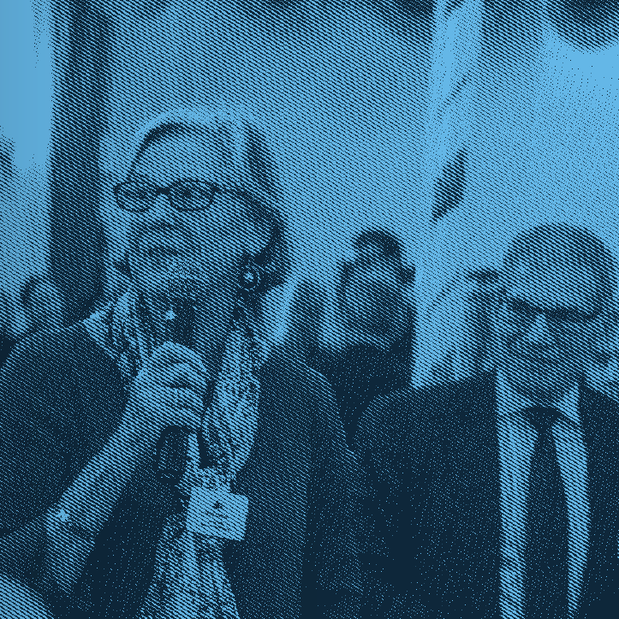2021 Annual Report
Reflecting on a year of RFF's research, analysis, and insights confronting the challenges brought on by global climate change.
Overview
In 2021, the COVID-19 pandemic continued to pose a variety of unique challenges to researchers, especially those examining the large-scale threats posed by global climate change. As a new administration took office at the beginning of the year, researchers at RFF worked to proactively inform decisionmakers in the public and private sectors through its rigorous, impartial analysis in energy and environmental policy.
Read more about RFF's leadership in research and policy analysis in our 2021 Annual Report.
Letter from the President
In 2022, we will celebrate the 70th anniversary of Resources for the Future (RFF)—a milestone achievement for any organization. As we prepare to mark seven decades of research, engagement, and solution-making, I have been called to reflect upon 2021, a year that, for all its challenges, has brought out the very best of RFF. As I believe you will see in the pages that follow, the problems and uncertainties of the last year were met with creativity, collaboration, agility, and resilience from the team of experts that make RFF what it is.
As 2021 began, RFF greeted the year with proactive research and analysis. As a new administration took office, RFF released its eight-part Federal Climate Policy Toolkit, which details the suite of policy options that is available to drive decarbonization across a variety of sectors, from transportation to industry and fuels. This toolkit, which presents sector-by-sector and economy-wide approaches to curbing emissions across the United States, has proven to be one of our most popular publication series in 2021.
Throughout the year, we’ve worked to inform decisionmaking in the Biden administration, as well as across the aisles of the 117th Congress. Our experts have testified before Congress, engaged in numerous private briefings, and delivered more than 300 publications and commentaries.

With an Inauguration Day executive order to re-establish the interagency working group responsible for calculating the social cost of greenhouse gases, RFF’s ongoing work to drive an estimate based on the latest science became even more relevant. Researchers with our Social Cost of Carbon Initiative have worked since 2017 to calculate an estimate of the cost of climate damages that is accurate, transparent, and based on the best available science. In this report, you’ll find out more about the crucial work we’re doing to inform the interagency working group’s updated estimate of the social cost of greenhouse gases, slated for early 2022.
Throughout the year, we’ve worked to inform decisionmaking in the Biden administration, as well as across the aisles of the 117th Congress. Our experts have testified before Congress, engaged in numerous private briefings, and delivered more than 300 publications and commentaries. Drawing on our powerful economic modeling capabilities, RFF scholars have helped to inform critical decisions about infrastructure, clean energy provisions within the budget reconciliation package, and funding for advanced energy technologies authorized in the Energy Act of 2020.
RFF’s body of research in 2021 has contributed new insights on historical environmental injustice and is helping chart a more equitable way forward. Our growing body of research on environmental justice and marginalized communities includes our ongoing Exposure event series with the Urban Institute that explored the current state of environmental justice research across disciplines. As this work continues in 2022 and beyond, we welcome your perspectives and ideas to hone this agenda and make it as inclusive and impactful as possible.
We are also building our body of work on adaptation and resilience strategies. Communities around the world are experiencing the impacts of climate change—from sea level rise and coastal flooding to extreme storms and heat waves—and our experts are evaluating strategies that can enhance resilience to extreme weather events and encourage effective community adaptation. For example, RFF scholars are analyzing microinsurance as a method to improve the financial resilience of low-income households.
From our early days assessing natural resource scarcity to our present-day focus on confronting climate change and its economic impacts, RFF has been guided by an unwavering commitment to rigorous and impartial analysis.
RFF also supported state- and local-level decisionmakers in 2021 as we worked to advance economically and environmentally sound policies. Our Equity in the Energy Transition Initiative explores case studies of coal-mining towns in Ohio and Montana, aiming to learn lessons about employment effects and social welfare in resource-dependent communities. We worked with major regional programs like the Regional Greenhouse Gas Initiative and the Transportation Climate Initiative to support states in their collective efforts to reduce emissions, provide public services, and promote economic growth. Recognizing the global nature of the climate crisis, RFF continues to research international policy options and engage with decisionmakers around the world. For instance, our experts have been examining how to utilize border carbon adjustments to ensure fair conditions for global trade while enabling national ambition to decrease carbon emissions. From international public opinion surveys of climate pricing in Sweden, to an in-depth review of German policies that assist coal communities in transition, research from RFF and our colleagues at the RFF-CMCC European Institute on Economics and the Environment has offered important lessons for policymakers.
Through it all, we have focused on our vision of a healthy environment and a thriving economy, which has defined RFF’s work for seven decades. From our early days assessing natural resource scarcity to our present-day focus on confronting climate change and its economic impacts, RFF has been guided by an unwavering commitment to rigorous and impartial analysis. RFF was founded on October 7, 1952, and on October 7, 2021 we celebrated our first annual “Founders’ Day”—an opportunity to honor our legacy. As we prepare to mark RFF’s 70th anniversary, we are building out a suite of signature products to highlight RFF’s legacy and our vision for the decades to come, including special event programming, dedicated magazine editions, and more.

None of this impact would be possible without the passion and commitment of the individuals who make RFF what it is. This year, I want to give thanks in particular to our outgoing Vice President for Research and Policy Engagement, Ray Kopp. During his four decades with RFF, Ray’s research leadership has truly helped make RFF into the organization that it is today, and we are fortunate to continue working with him in his new capacity as director of our Comprehensive Climate Strategies Program.
I am also pleased to announce that Billy Pizer has stepped into the role of Vice President for Research and Policy Engagement. Billy, who spent a decade working as a researcher at RFF earlier in his career, joins us from the Sanford School of Public Policy at Duke University; he also previously served as Deputy Assistant Secretary for Environment and Energy at the US Department of the Treasury. We are so pleased to welcome Billy back in this new capacity, and we already have seen great impact under his leadership in just a few short months.
Ray and Billy both have made substantial contributions to our updated research and policy engagement strategy, which we implemented in 2021. RFF is now home to seven programs and eight initiatives, each of which encompasses one of RFF’s distinctive research priorities in our overarching climate strategy to design smart emission reduction strategies, confront risk, and build resilience. In the “Impact” section of this report, you’ll find out more about these programs and initiatives, and the exceptional research and policy engagement that each is undertaking.
In 2021, RFF welcomed two new members to its Board of Directors. Janet F. Clark joins us with decades of experience in the investment banking, financial consulting, and energy sectors; she has been named as one of Forbes’s “One Hundred Most Powerful Women.” H. Russell Frisby joins our board with two decades of experience providing regulatory and corporate counsel to companies across the energy, communications, and technology spheres. We feel fortunate to be welcoming both Janet and Russell, and we look forward to working with them.
We also recognized Ambassador C. Boyden Gray, who retired from the Board of Directors in October. Boyden has been an extraordinary supporter of RFF for more than two decades. We are grateful for his service on the board and look forward to continuing to engage with him in the years to come as a member of our President’s Council.
The country and world have made tremendous strides over the past twelve months. While we will continue to face challenges, from climate change to COVID-19, I am optimistic about our collective ability to take truly transformative action. The problems, threats, and uncertainties of the last year have been met with the very best that RFF could deliver—a combination of time-tested analysis and trusted engagement, together with new and dynamic approaches to finding solutions to the biggest challenges of the day.
Thank you for all that you do in support of RFF. Our work is made possible by each of you who believes that today’s environmental challenges require the best independent research and effective, efficient, and equitable solutions to protect the climate, enhance nature, and advance our well-being.
Richard G. Newell
President and CEO
Resources for the Future
Our Year in Numbers

We’re a 501(c)(3) nonprofit organization with a $16 million budget

Our website generated more than 1.5 million page views

Our podcast episodes were played more than 90,000 times

More than 13,000 people tuned in to watch RFF webinars

We were cited in more than 1,300 news articles

We wrote 330 publications and commentaries

250+ foundations, corporations, and individuals supported us

RFF was ranked #1 for environmental economics globally
Supporters
The generous resources provided by our supporters enables RFF to deliver the impact described in our Annual Report. Learn more about supporting RFF or find out about our supporters.
Financial Summary
Revenues
In fiscal year 2021, RFF’s operating budget was $15 million, over two-thirds of which came from grants from foundations, governments and other organizations, and individual and corporate contributions. RFF’s operating budget in fiscal year 2022 is $16 million. RFF augments its operating revenue with net income from its building and earnings from its reserve fund. At the end of fiscal year 2021, RFF’s reserve fund was valued at $66 million.
Expenses
RFF research and policy engagement represented 79 percent of total expenses in 2021. Management, administration, and development expenses combined were 21 percent of the total. RFF’s audited financial statements, as well as detailed breakdowns of revenues and expenses, are posted on our website annually. These can be accessed on our Financial Reporting page.
